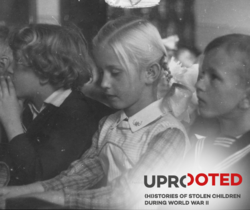Historical essays on stolen children
Seven authors coming from Germany, Poland, the Czech Republic and Ukraine present the history of stolen children from Central and Eastern Europe during world war II and how the contemporary memory of these events has been shaped in different ways.
The essays are available in English and in their original languages. The German translation of all the articles is in preparation.
Read all the articles in English
Read the two original articles from the Czech Republic in Czech
Read the two articles from Germany in German
Read the two articles from Poland in Polish
Read the two original articles from Ukraine in Ukrainian
Learn more about the project "Uprooted – (Hi)Stories of Stolen Children during World War II
Barbara was taken to a transitional children’s home where she was examined again, measured and photographed. The experience was beyond her comprehension and left her deeply distressed. The grandmother managed to find her granddaughter one more time and had a few furtive words with her through the fence. The little girl answered with “ja” rather than “tak”. Even here, the children were forced to use German, a language they weren’t familiar with at all. Any of them who spoke their mother tongue were punished. The process of “Germanization” had begun.
from: "Taken away to be made into Germans. The Fate of Children Abducted from Eastern and Southeastern Europe under the National Socialist Regime" by Dorothee Schmitz-Köster

